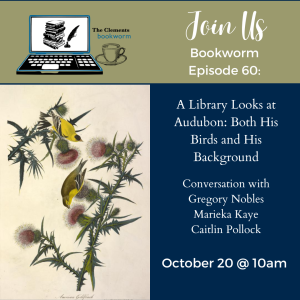Presented By: William L. Clements Library
The Clements Bookworm: A Library Looks at Audubon, Both His Birds and His Background

John James Audubon (1785-1851) was arguably the most famous artist/naturalist of the nineteenth century, and his massive, four-volume work, The Birds of America (1827-1838), remains an exceptional achievement of avian art, a rare and exceedingly valuable book now found mostly in major scholarly institutions and libraries, including the University of Michigan.
By the twentieth century, the name Audubon had become emblematic of bird appreciation and, more broadly, natural history, and the National Audubon Society emerged as one of the most significant environmental organizations in the United States.
In recent years, however--certainly since 2020--John James Audubon's personal background as a slaveholder and opponent of abolition has come to taint his reputation and create a problem of identity for the organization that bears his name. This talk discusses Audubon's legacy, as both artist and racist, inviting us to explore the connection between a brilliant but flawed figure and the continuing impact of his remarkable art.
By the twentieth century, the name Audubon had become emblematic of bird appreciation and, more broadly, natural history, and the National Audubon Society emerged as one of the most significant environmental organizations in the United States.
In recent years, however--certainly since 2020--John James Audubon's personal background as a slaveholder and opponent of abolition has come to taint his reputation and create a problem of identity for the organization that bears his name. This talk discusses Audubon's legacy, as both artist and racist, inviting us to explore the connection between a brilliant but flawed figure and the continuing impact of his remarkable art.